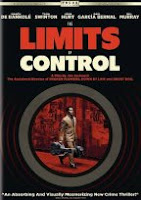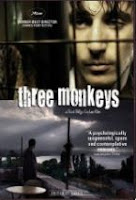Buckets of good stuff for November and quite a few that didn't make this list: Up, Wings of Desire, North by Northwest: 50th Anniversary, Food Inc., Lake Tahoe and Evangelion 1.01: You Are (Not) Alone. Here's the nine that did make the list along with my arguments/persuasions for each:
The Golden Age of Television [Criterion]
There is quite a bit of talk these days regarding the quality of contemporary television. God knows, we have never had so many choices, ranging from the low-cost high-revenue of reality shows to top-notch drama that truly gives theatrical features a run for its money. If you think you have seen everything when it comes to television, maybe it’s time to check the archives. Criterion proves that there might be something to learn from television when it was in its infancy in “The Golden Age of Television.” Collecting eight “live American television plays” that originally aired in the 50s (and later presented on PBS in the early 80s), ‘The Golden Age’ is peppered with nostalgia, yet still feels innovative today. Each episode is stocked with actors who were then up-and-coming but who are now icons of both the big-screen and small-screen. Rod Steiger, Paul Newman, Elizabeth Montgomery, Andy Griffith, Paul Newman, Jack Palance, Mickey Rooney, Julie Harris and Piper Laurie are just a few of the fresh, and very familiar, faces. Housed on three DVDs, ‘The Golden Age’ also includes director commentaries on six of the eight episodes as well as interviews from the influential cast. With eight hours of content, this set is perfect for a snow day.
Gomorrah (2008) Directed by Matteo Garrone [Criterion]
Usually it is pretty easy to distinguish a narrative film from a non-narrative, but there are those rare exceptions that fall somewhere between the predictable and the experimental. “Gomorrah” is just such a film, unreeling violent action with little or no context. Even attempting to find continuity with characters is a dead end because their motives are random and incomprehensible and they are more than likely to end up dead in the next five minutes. Such is life in the Naples crime syndicate, the Camorra. Unlike most films that are adapted from books, Gomorrah takes a completely different approach to the material presented in Roberto Saviano’s bestseller of the same name. Saviano’s shocking personal account of the Camorra is a mind-boggling whirlwind of facts and details. Matteo Garrone takes the facts and creates raw visual with no grounding, almost as if to say that the literal facts really don’t matter. Although Criterion’s release does not have the Garrone/Saviano commentary I had been hoping for, it does include interviews with Garrone and Saviano, as well as actor Tony Servillo.
The Exiles (1961) Directed by Kent Mackenzie [Milestone]
The Exiles is no Killer of Sheep (both products of Milestone Film’s hard work), but it is an artful document of a time and place that received a long overdue theatrical release last year. Set in the Bunker Hill neighborhood of Los Angeles shortly before it was razed, The Exiles is a gritty realistic portrait of modern Native American life. Director Kent Mackenzie shot the film in collaboration with his nonprofessional actors, which resulted in an immediate, street-wise feel. This night-in-the-life captures the aimlessness, celebration and sadness of the moment and never collapses into melodrama. Beautifully shot, the film has been restored to perfection with the velvety shadows and sparkling lights of 1960 LA coming to life. Milestone spared no detail in the release of the two-disc set, collecting all relevant artifacts in one package. This DVD is more of a resource than a rental, filled with short films, interviews, a commentary and even downloadable PDF files.
Ballast (2008) Directed by Lance Hammer [Kino]
One of the big buzz films of the 2008 Sundance Film Festival, Ballast was unable to maintain the high and slowly faded from the forefront. Although it received great critical acclaim, it was unable to draw upon the average moviegoer. Lance Hammer builds a powerful character driven drama about life on the margins from a cast of non-professional actors. Lawrence is a middle-aged man internally struggling with the recent suicide of his brother. As life goes on, almost against Lawrence’s will, he is jarred from his depression by his 12-year-old nephew who is teetering on the edge of a life of violence. Set in the Mississippi Delta, Ballast is a subtle film focusing on the quiet details of human nature that never feels forced or contrived. It is unfortunate that Ballast did not get a more fair shake in the movie marketplace, because it was easily one of the best films of 2008.
Pray the Devil Back to Hell (2008) Directed by Gini Reticker [Passion River]
Hardly a week passes without hearing about yet another devastating account of how the idealistic notion that people have the power is quashed by the tyranny of government (even our own.) But Pray the Devil Back to Hell restores some faith. After years of civil unrest in Liberia, ordinary women from all walks of life bravely stood up to the type of forces that could have totally wiped them out. Committed to peace, these women stood up to reigning warlord Charles Taylor (and his child army) to eventually change the course of history, leading to Taylor’s exile and election of Ellen Johnson-Sirleaf. Perhaps aware of the extraordinary nature of the story, director Gini Reticker takes the most conventional approach possible to this documentary. Allowing the interviewees and archive footage speak for themselves, Reticker thankfully sees no need to embellish themes or drama in a portrait that is already crystal clear and unbelievably inspiring.
Thirst (2009) Directed by Park Chan-wook [Focus]
Park Chan-wook, no stranger to controversy, has once again divided audiences. But this time he does so, not with violence or divisive content—even though that is very much present—but with structured chaos: one person’s convoluted mess is another person’s brilliant design. I’m unwilling to commit to either one, but I will say that the structure is very unique. It spirals, generally in one direction, like the wire binder in your notebook only stretched out beyond the normal length. Minor plot motifs loop around with some resolution only to engage in another minor storyline. Themes and analogies are left dangling as the film moves at a swift and mysterious pace. Thirst is a vampire movie, but said vampire is a priest, his ‘vampirism’ is contracted in Africa from a blood transfusion, and his lines of morality continually shift. Park’s biggest failure is giving us too much to chew on and far too much to digest in one sitting. If you are a fan of the film, it might be best to wait for the Korean import. Focus puts zero effort into the Thirst DVD, which is too bad because they probably could have recouped some of their investment in a smartly packaged DVD. Proving just how schizophrenic US studios are, Park’s films have garnered elaborate 3-disc sets (Oldboy) to no release at all (I’m a Cyborg, But That’s Okay) to an early but nonetheless bare bones Thirst DVD.
The Limits of Control (2009) Directed by Jim Jarmusch [Focus]
Jim Jarmusch’s latest offering may be more style than substance, but it is a style worth celebrating. The Limits of Control is brilliantly surreal within the very rational boundaries of cinematic iconography: an action film with no action; a mystery with no answer; a means with no ends. Isaach De Bankolé, a nameless man for hire, does not so much play a character in the film more than he acts as a vessel—for ideas and curiosities of the world, but more importantly for cinematic ideals and the very practical application of creativity and the imagination. The eclectic cast lights up what would otherwise seem esoteric and rudimentary including Bill Murray, Tilda Swinton, Gael García Bernal, John Hurt and Alex Descas. The Limits may not be one of the best films of the year, but it is certainly one of the more interesting ones. The DVD includes a 50-minute documentary shot while filming The Limits of Control titled Behind Jim Jarmusch full of tidbits like: “When you work with Chris Doyle, you carry a gun, and you feel like using it every other shot.” It includes many such off-the-cuff remarks from Jarmusch, random comments from cast and many scenes characterizing the mundane moments of making movie magic. There is also a mesmerizing four-minute montage of clips not used in the film called Untitled Landscapes.
Three Monkeys (2008) Directed by Nuri Bilge Ceylan [Zeitgeist]
Nuri Bilge Ceylan’s sixth film and his third to have a relatively wide international release, Three Monkeys, proves that Ceylan is a chameleon within his own aesthetic. Far from the laconic poetry of Distant and the formal emoting of Climates, Three Monkeys cuts loose to explore more conventional tropes and brilliantly treads the edge of genre filmmaking. An accidental death sets in motion the upheaval of an already troubled family. Although Ceylan’s allusion to the Three Wise Monkeys clearly refers to the three members of the family, it is open ended to a more ironic interpretation. A certain amount of doom is felt in the foreboding but picturesque lighting where the grays seem to hang as heavy as the clouds. Taut and incredibly suspenseful, Three Monkeys vibrates from the energy of the performances, cinematography and Ceylan’s own incredible sense of timing. The DVD is nothing to get worked up about if you saw the film on the big screen; extras include an interview with Ceylan in the liner notes and trailers for Three Monkeys and Climates.
Avant-Garde 3: Experimental Cinema 1922-1954 [Kino]
Kino devotedly keeps toiling away at the thankless but invaluable job of gathering innovative films that rarely have homes outside museum archives and specialty screenings. If Volume 1 and 2 in this series (release in 2005 and 2007 respectively) taught us anything, it was not to underestimate these innovative and relatively unknown filmmakers as experimentalists for experimental sake. “Avant-Garde 3” continues on that same path. These artists pushed the boundaries of the time-motion format that continues to challenge the conventions of film today. With over five hours of material spread over two DVDs, it presents 18 films from the collections of the George Eastman House and Raymond Rohauer that can thankfully play at a couch near you.
(Originally published on In Review Online.)









4 comments:
Gomorrah has been high on my list to see for a long time. Of course, you would guess that I've seen Up...for a kid's movie it isn't half bad.
I highly recommend the book - it really is a perfect compliment to the film.
Wowie, some great ones in here and I haven't even seen Gomorrah, Thirst, or the Limits of Control.
I'm glad Ballast is finally out and can hopefully reach a bigger audience. It was in my top 5 last year. And Pray the Devil was also criminally overlooked on pretty much all sides. Such a powerful story.
And hey - we saw Three Monkeys together!...I think? Those MSPIFF screenings all kind of blend together in my head...
Yes! We did see Three Monkeys together...such a long time ago!
Post a Comment